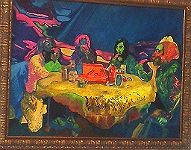Geert Wilders discusses in one of his many speeches that ground level organizations are important in exposing the raw views of dissatisfied ordinary people. But that such discontent cannot remain at the grass roots level.
Mike Church and Larrey Anderson show in their recent American Thinker article, "Who will lead the TEA Party?" that leaders of the original Tea Party movement were officials in local governments, who were trying to diffuse the controls of the central (British) government. Ironically, they were in fact trying to uphold the Constitution of the time, which was English Constitution of 1688.
These original Tea Party members were not some anarchic, anti-government groups with haphazard radical protesters. Church and Anderson write, "these men were united in opposition to Parliament's usurpations of their liberties," and their leaders were "the equivalent of our finest state legislators, mayors, city councilmen, etc."
The current Tea Party movement is also not devoid of its government, or former government officials. Freedom Works, an organized body which influences the movement, has Dick Armey as its chairman. Armey is a former house majority leader, who makes statements like, "Let’s not leave them [the GOP] to their own devices."
Influencing and changing negative government authority should certainly be the ultimate aim of grass roots activities. This requires that their leaders be familiar with politics, with the intention of entering and leading in such a political environment, if not influencing that political environment from powerful external groups (as Freedom Works is doing).
If one does a survey of counter-jihad activities around Europe, there is a similar pattern. Grass roots discontents are channeled into politics and the formation of political parties, or political representatives. Wilders’s PVV in the Netherlands, Filip Dewinter of the Vlaams Belang Party in Belgium, Stop the Islamization of Denmark, the Sweden Democrats, all originated from movements or leaders who were sensitive to the agitated public whose grievances weren’t addressed by the major political parties.
A similar approach is necessary here. Counter jihad groups should form alliances with seasoned, and like-minded politicians. If there are none, then the onus is on these groups to form an appropriate leader. As the original Tea Party movement has shown us, a revolution has to mature and evolve into something substantial. People cannot live on slogans and marches alone. Concrete changes can only be made when leaders are also involved in politics.
skip to main |
skip to sidebar


NEW OUTLOOK,






.

.
NEW OUTLOOK,
SAME ISSUES
.
.

.

.
BLOG ARCHIVE
-
▼
2010
(63)
- ► April 2010 (12)
- ► March 2010 (15)
-
▼
February 2010
(9)
- "We are here for the Netherlands, we are here for ...
- Grass Roots Counter Jihad Movements Need to Be Cha...
- The Only Individual Who Writes "Stop Muslim Immigr...
- Is There a Counter-Jihad Movement in Canada?
- Commentary on the Activities Planned by the Freedo...
- Starting a New Counter-Jihad Organization Is Not t...
- Ayaan Hirsi Ali's Latest Update
- New Developments on the Wilders Case
- Computer Glitches
- ► January 2010 (10)
-
►
2009
(125)
- ► December 2009 (17)
- ► November 2009 (23)
- ► October 2009 (23)
- ► September 2009 (2)
- ► April 2009 (9)
- ► March 2009 (6)
- ► February 2009 (5)
- ► January 2009 (5)
-
►
2008
(29)
- ► December 2008 (4)
- ► November 2008 (3)
- ► October 2008 (2)
- ► September 2008 (20)
-
►
2007
(2)
- ► November 2007 (1)
- ► January 2007 (1)
.


.
.
TOPICS
.
- About
- Action
- Ads
- Art
- Articles
- Books
- Buildings
- Christianity
- Comedy
- Converts
- Counter-Jihad Movement
- Culture
- Design
- Dress
- Emails and Letters
- Europe
- Events
- Exhibitions
- Fatwa
- Film
- Food
- Freedoms
- General
- Government
- Halal
- Holidays
- Human Rights Commissions
- Immigration
- Interviews
- Islam
- Islamization
- Jihad
- Koran
- Language
- Laws
- Lawsuits
- Mosques
- Multiculturalism
- Music
- Muslims
- Other
- Personalities
- Politics
- Racism
- Religion
- Schools
- Sharia
- TV
- women
.
.

.




